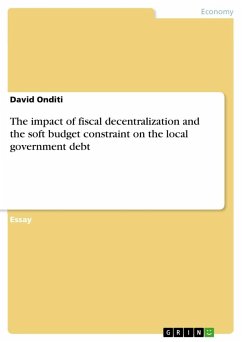This is a story of the soft budget constraint. It seeks an answer to a paradox: the prevalence of the soft budget constraint in spite of the tremendous inefficiencies that it gives rise to, and its persistence in spite of reform of the system of which it is an integral part. The story aims at increasing our understanding of why the phenomenon exists. By studying the case of state in Tanzania before, during and after socialism, an explanation of the owned enterprises emergence, persistence and logic of the soft budget constraint is suggested. This introductory chapter presents an argument showing why this story is worth telling. It discusses the research topic and how the problem it presents is attacked. THE SOFT BUDGET CONSTRAINT The soft budget constraint is today a popular metaphor. Originally it was seen as a characteristic of the socialist system. It refers to the tendency of primarily state-owned enterprises to have their liquidity gaps or losses accommodated by the state, or some other external funding body, and to the resulting expectations of such bail-out. The concept was coined by the Hungarian economist Hmos Kornai. ' He distinguishes between four major forms of external financial assistance that contribute to the soft budget constraint: soft subsidies, soft taxation, soft credit and soft 2 administrative pricing.
Hinweis: Dieser Artikel kann nur an eine deutsche Lieferadresse ausgeliefert werden.
Hinweis: Dieser Artikel kann nur an eine deutsche Lieferadresse ausgeliefert werden.
`In the fast-growing literature on this phenomenon The Soft Budget Constraint: The Emergence, Persistence and Logic of an Institution by G.E. Skoog opens a new path: this is the first book applying the study of the concept to a developing country. It provides in a lucid style rich empirical material and convincing analysis of the causes and consequences of the soft budget constraint syndrome in Tanzania. Her insights will probably be applicable in many other countries as well.' János Kornai, Harvard University, USA and Collegium, Budapest, Hungary
`In the fast-growing literature on this phenomenon The Soft Budget Constraint: The Emergence, Persistence and Logic of an Institution by G.E. Skoog opens a new path: this is the first book applying the study of the concept to a developing country. It provides in a lucid style rich empirical material and convincing analysis of the causes and consequences of the soft budget constraint syndrome in Tanzania. Her insights will probably be applicable in many other countries as well.'
János Kornai, Harvard University, USA and Collegium, Budapest, Hungary
János Kornai, Harvard University, USA and Collegium, Budapest, Hungary








